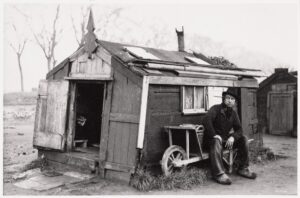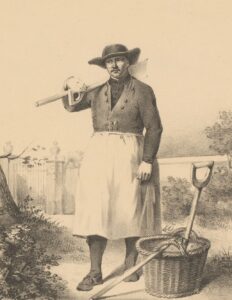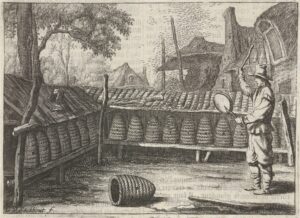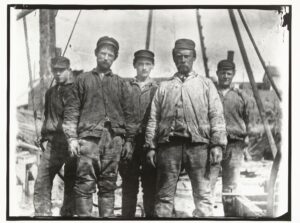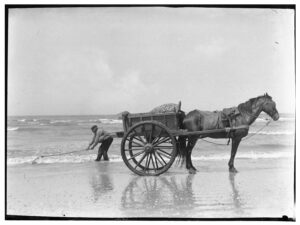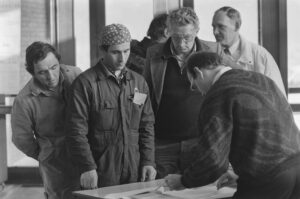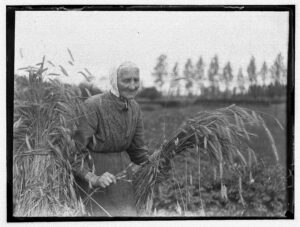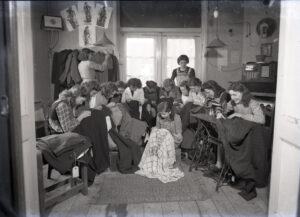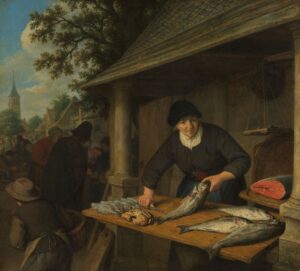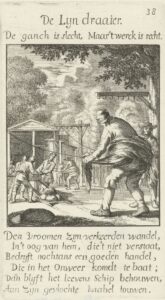A palingvisser is a fishermen that specializes in catching eel. Several villages around the Zuidersee (South Sea, now a lake called IJsselmeer), like Volendam, were famous for their eels. … [Read more...]
Dutch term – Gardenier
The word gardenier can have different meanings, depending on the location: In Friesland, it typically meant a small farmer, usually someone who grew crops like potatoes or other vegetables. In other places it typically meant gardener. Another Dutch word for gardener is tuinman. If you are unsure which is meant, check other records. If several neighbors were also gardeniers, chances are they were farmers. The same goes if the ancestor owned farm land, which you can find in cadastral, … [Read more...]
Dutch term – Imker
An imker is a beekeeper. It is rare to find imker as an occupation in Dutch records since few people kept bees as their main income stream. I have found beehives (bijenkorven) tallied in estate inventories of some of my ancestors who owned farms, which told me they kept bees. The number of hives suggested they were not just for personal use, so they probably sold honey on local markets. You can find estate inventories in notarial records. … [Read more...]
Ask Yvette – Difference between arbeider, werkman, dagloner
A reader asked me what the difference is between the occupations arbeider, werkman, and dagloner. Arbeider and werkman are synonyms and both mean "laborer." These are usually people who work for an employer for a longer period of time, typically a year, in return for an annual wage. A dagloner is a day laborer, somebody who does not have a fixed employer but is hired and paid per day. All these occupations perform manual labor, typically unskilled, for an employer. Laborers were usually … [Read more...]
Dutch term – Schelpenvisser
A schelpenfisher is a shellfish fisherman. … [Read more...]
Dutch term – Ontslagen
Ontslagen means "discharged." It can mean that someone was fired from a job, but also that they were discharged from a facility like a prison or beggar's colony. For example, there is the Geheim Register van Ontslagen Gevangenen, the Secret Register of Released Prisoners. … [Read more...]
Dutch term – Boerin
A boerin is a female farmer. Women worked alongside the men on a farm. They were often responsible for the work in and around the farm, taking care of the animals and food preparation, while the men mostly worked the fields. But in August, everyone would work together to get the harvest in. … [Read more...]
Dutch term – Naaien, naaister
Naaien means to sew. A naaister is a seamstress. In the past, professional naaisters were typically poor women, though women of all classes were taught the basics. Naaien could be done from home, and was an employment possible for women with young children. It is one of the few occupations open to women with children out of wedlock, who would rarely be welcome to work as servants in "respectable" households or stores. … [Read more...]
Dutch term – Visvrouw
A visvrouw [literally: fish woman] is a female fish seller. It was not uncommon for wives of fishermen to sell the fish at markets. … [Read more...]
Dutch term – Touwslager or lijndraaier
A touwslager or lijndraaier is a rope maker. The occupation can be found in many places, especially near harbors. Ropes for rigging were made in a lijnbaan, a ropeway to create long ropes. … [Read more...]
